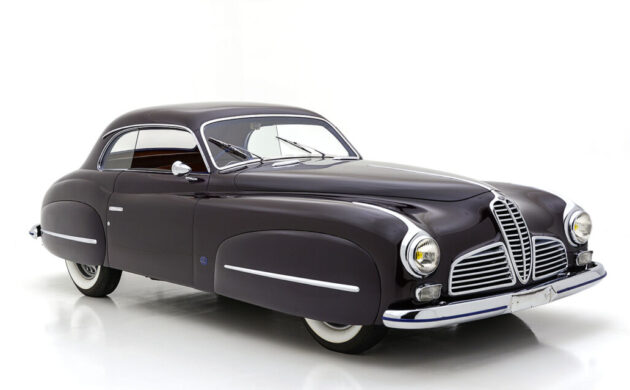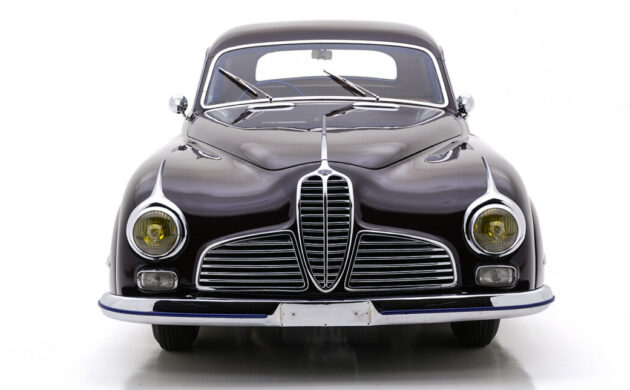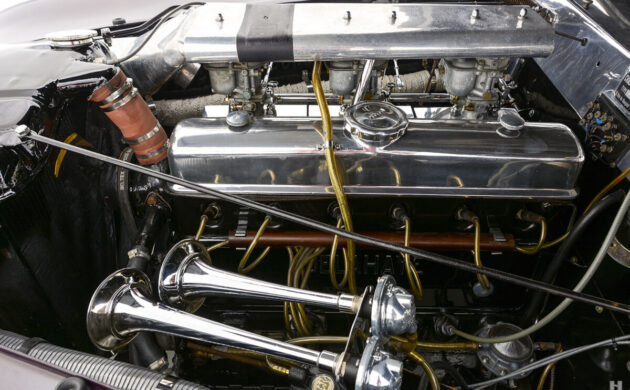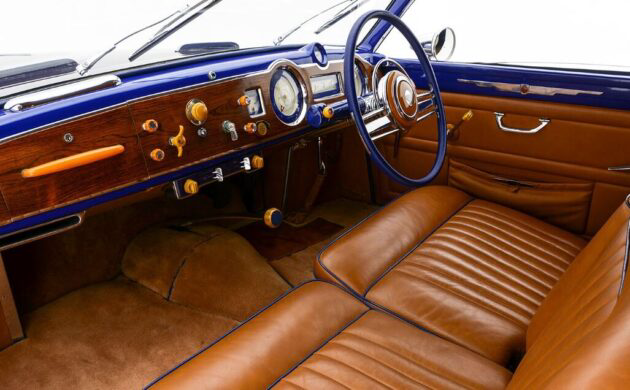Émile Delahaye might make you reconsider Henry Ford. In America, we tend to think of Ford as an early innovator. I am not disputing Ford’s importance in any way, but he wasn’t the only one tinkering in a garage. In fact, the birth of the automobile, as much as any other human invention, was a worldwide phenomenon. Émile Delahaye (who studied with Louis Delâge, another scion of splendid cars) formed his company in 1894 in Tours, France. He wasn’t making bicycles or horse carriages either. He trained as an engineer and studied combustion engines in his early career, so Delahaye came right out of the gate making trucks and cars. While the company met plenty of success with its low-production vehicles in the pre-war period, its most extravagant vehicles arrived post-war. Here at Hyman Ltd is a rare example of a 1949 Delahaye 135 Ghia coupe with an asking price of $479,500. This car is in Hyman’s facility in St. Louis, Missouri – a facility thoroughly worth a trip if you are nearby. We have Larry D. to thank for this splendid tip!
Type 135 chassis were offered to many a coachbuilder for finishing; this particular car is a one-off bodied by Carrosserie Ghia-Aigle, a Swiss firm that made cars to Ghia’s designs. Despite the passage of thirty-two years since a restoration undertaken in France, its aubergine bodywork and paint are nearly perfect. Special features include wheel spats that can be lifted with a lever to facilitate changing a tire. The yellow headlight lenses were a French phenomenon; Hemmings wrote an excellent article on “why yellow in France?” here.
This car benefits from the “MS” version of the early in-line six-cylinder engine, originally derived from Delahaye’s truck line. An overhead valve design displacing 3557 cc’s with three Solex carburetors, horsepower reached 140. This Delahaye is fitted with a Cotal-Maag electromagnetic gearbox, with four forward speeds and four reverse speeds. Electromagnetic gearboxes can be thought of as semi-automatics; after considerable research, I can report that the buyer of this car will likely find scarce resources for that gearbox. Performance was sporting, as the car’s wider track versus earlier cars improved handling.
The interior is spectacular, with bronze leather and bright blue accents. The dash is resplendent with caramel-colored knobs and well-finished wood. The doors, with matching leather panels and delicate fixtures are themselves works of art. As can be expected with a car of this caliber, nearly its entire history is available. Also as can be expected – since this is a one-off – it’s easy to find the car changing hands in the past. Here, for instance, it was sold at Bonham’s Paris auction in 2019 for $226,000, a relative bargain compared to today’s price. No, none of us is going to run off to St. Louis to hand Mark a check, but it’s worth taking a moment to appreciate the individuals who fashioned cars like this, for in every car we love today, there’s a tiny bit of the DNA of these ancestors.








A Whatdahey? No, a Delahaye, whoo-wee, so that’s where Nash got the “no wheel well” look from. Half a mil,,chump change,,for some. Certainly nobody here, I don’t think, I mean, who that looks at rusty pickups is sportin’ that kind of change. I don’t know, it’s a swoopy thing, but it’s a car, in typical over the top European glitz. Pretty fancy inside, I could just see some kid puking all over that beautiful dash, I know, still, Americans didn’t need that kind of glamour. Apparently, the Europeans did. Why 4 speeds in reverse was needed, is a mystery to me and wheel spats, of course, THAT would have saved some knuckles. Half a mil,,,really, provided the price didn’t slow you down, what are you going to do with it? Half a mil buys a pretty nice boat, and you can sail away from this foolishness,,,
“Why 4 speeds in reverse”? Most likely the gearbox only had 4 gears, with some sort of idler gear or transfer case that could be engaged to reverse the direction of the input or output shaft, thus all 4 gears happened to be available in reverse as well as forward.
this trans is from their w.w. ii tanks…they worked well…
I apologize in advance, but I simply can’t ignore the opportunity to say something about French tanks with a 4 speed reverse gearbox . . .
I guess this makes sense, so French armored troops didn’t have to spend time turning the tanks around before retreating!
That said, I love Delahaye cars of the ’30s and ’40s. My shop was given the task of copying and installing replacement body wood framing on a Henri Chapron Delahaye cabriolet, and my Haitian woodcarver loved the challenge.
Well.
At least I got educated on why France regulated yellow headlights. Went down that rabbit hole for a few minutes
These aren’t automobiles, they’re self propelled pieces of art. They have some at the Peterson museum in LA. Just incredible.
The Mullin museum in Oxnard California should have these as well. The museum is supposed to be devoted to French cars and many have been to Pebble Beach. Really want to go there.
Bob you are correct. Have you ever seen an ugly Delahaye? The V W a day ago for a half million or this? Is that even a decision?
Our 1930-delahaye was a cheaper in its day the cv9 was bought for a small castle in Limosine ,taken by occupation forces, used as a staff car at an interment camp in St. Paul , repatriated by a resistance soldier. Used in parades till 70s then stored in a barn 2018 discovered ,bought imported from France to LosAngels in 2019. Still seeking a buyer or trade for a home in California. 949 247 6425 Chris M.
The dash and interior are stunning, and I laughed picturing the kid barfing all across it while stuffed shirt daddy proceeded to lose it.
I thought the 1949 Delahaye 175 S Saoutchik Roadster was ugly. And I was under 10 years old at the time.
Lovely piece of automotive art for Delahaye in its dying days. The company stopped building cars after WW2, but continued with trucks and a specialisation in fire engines.
Ghia-Aigle may have started out building Ghia designs but did their own thing as well. They didn’t always hit the sweet spot but always interesting.
I could see Rita Hayworth driving this car down Wilshire Blvd. in 1949. I’m not a movie star, and it’s not 1949. C’est la vie.
Windshield wipers?
Who would take this beauty out in the rain?
I like the car well enough but this is ‘barn finds’ so it’s seems a bit of a stretch to have this under that catagory. I doubt this was EVER in a barn. LOL
Alright.
The conclusion stated by Hemmings review from the technical
point is true and yellow light is less glaring than white.
The difference to white is especially good in rain and snow at
night. Many street light poles also use amber or yellow to smoothen
the light cone.
Coloured bulbs make a brighter illumination then lenses in cars
whose are brighter then sleeved bulbs, whose are despised in
the wide range of ancient automotive users and collectors.
Their war theory is wrong as the French ‘innovation’ from white
to yellow in front of ww2 based on the simple assumption to
differ driving ‘krauts’ from French origin citizens. Sourkraut. lol
And Ghia, Ghia built always special bodies for special clients
and not that much as Graber made for a broad range of
manufacturers. A precious toy here but 225’000 is its price.
Regarding the “Hyman Ltd facility” . . . I Googled it, and wondered is it a place a person can visit? Or, do you have to be a One Percenter? Or ???????
The price on this one would choke a team of horses. While it is a unique auto, the price would stop a trainload of buyers. What would you do if you stripped a gear in the trans.? Lovely looking car , but too impractical to be a daily driver. Give it to a museum and take a large tax break.
What are the chances of finding parts in stock at O’Reilly’s? I would HATE to go through the dilemma of needing parts for it.
Robert,
Just to see if it was even possible, I went on O’reilly’s website and using the drop-down menu, I entered the year; 1949, make; Delahaye, model; 135m, and they actually had it listed! They did have various modern items for the car, but nothing specific to Delahaye!
I wonder what the bloviator smokes before he scrawls?
No, none of us is going to run off to St. Louis to hand Mark a check, but it’s worth taking a moment to appreciate the individuals who fashioned cars like this, for in every car we love today, there’s a tiny bit of the DNA of these ancestors.
Very well said, Michelle, and thank you for sharing this work of art.
My pleasure! We owe thanks to our tipsters, too.